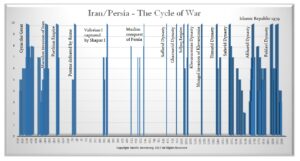The Geopolitical Chessboard: Analyzing Iran, Israel, and U.S. Foreign Policy Dynamics
In a recent exclusive interview, former President Donald Trump conveyed a rather controversial insight: he always "knew the date" Israel would strike Iran if diplomatic negotiations on the nuclear deal faltered. This assertion raises critical questions about the intersection of U.S. foreign policy and the overarching Neoconservative agenda. At Extreme Investor Network, we delve deeper into the implications of these geopolitical maneuvers, revealing the hidden strategies at play.
Understanding the Neocon Agenda
The Neoconservative movement, which significantly shaped 21st-century U.S. foreign policy, has utilized figures like Israeli Prime Minister Benjamin "Bibi" Netanyahu to advance its goals. It’s essential to recognize that while Trump positioned himself as a peacemaker, his administration was intriguingly intertwined with Neocon influence, represented by figures like John Bolton and Victoria Nuland. This interplay suggests a more complex narrative than simply a U.S.-Israel alliance against Iran.
Misplaced Assumptions and Risks of Escalation
Trump’s claim of knowing when Israel would act on Iran suggests an underestimation of Israel’s broader ambitions—namely, regime change rather than merely curtailing nuclear capabilities. His strategy to prevent the assassination of Iran’s Supreme Leader showcases a critical miscalculation: U.S. involvement risks dragging America into an unwinnable conflict that could embroil not just Iran but also Russia and China.
Historically, nations have engaged adversaries only to find themselves exposed to opportunistic attacks from other fronts. The events leading up to the Russo-Japanese War of 1904, for example, demonstrate how military distractions can invite aggression from perceived rivals. Japan seized an opportunity while Russia was preoccupied with internal conflicts, resulting in unexpected and decisive defeats for Russia. Similarly, Sweden’s invasion of Denmark during the Thirty Years’ War highlights how perceived vulnerability can become a dangerous lever for larger geopolitical games.
A Growing Military Threat
Today, as tensions rise, the U.S. must consider the ramifications of its involvement in Iran. What exacerbates this situation is Iran’s partnership with Russia and China. The technological advancements Iran has achieved in hypersonic missile capabilities—thank you in part to foreign assistance—are alarming. While Tehran insists its military developments are homegrown, Western intelligence consistently points to Russia as a key supporter of Iran’s technological aspirations.
The collaboration between Iran and North Korea further complicates matters. With a long-standing history of sharing missile technology, both countries’ ongoing interactions could lead to increasingly sophisticated military capabilities that pose a direct threat to U.S. interests and allies.
Military Strategy and Geopolitical Complexity
It’s crucial to note that Iran is currently enhancing its deterrence through advanced missile technology, like the “Fattah” and “Haj Qasem” missiles. This development showcases a blend of indigenous expertise and external technological infusion, particularly from Russia, which has gained significant leverage over Iran post-Ukraine conflict. Moreover, China, while more cautious, remains a shadow ally, potentially offering crucial dual-use technologies.
What does this mean for the U.S. and Israel? The Iron Dome, a pillar of Israel’s defense system, is not infallible. A well-coordinated attack from multiple directions could overwhelm it. U.S. military efforts to assist Israel highlight a dangerous precedent: direct involvement that could provoke a broader war, with potential ramifications reaching far beyond the Middle East.
Conclusion: The Path Forward
As we navigate this murky geopolitical landscape, it becomes evident that the risks far outweigh the perceived benefits of aggressive military posturing. Rather than following a Neocon-driven agenda that leads to protracted conflict, the U.S. should prioritize diplomacy and strategic collaboration to counterbalance rising threats without entangling itself in a quagmire.
At Extreme Investor Network, we believe understanding the nuances of these relationships is vital for investors and policymakers alike. The decisions made today will shape the geopolitical climate of tomorrow, and recognizing the historical parallels can provide invaluable insights into managing an increasingly volatile world.
Stay tuned to our site for more in-depth analysis and discussions surrounding global economic impacts and security dynamics which can affect your investment strategies and outlook.

